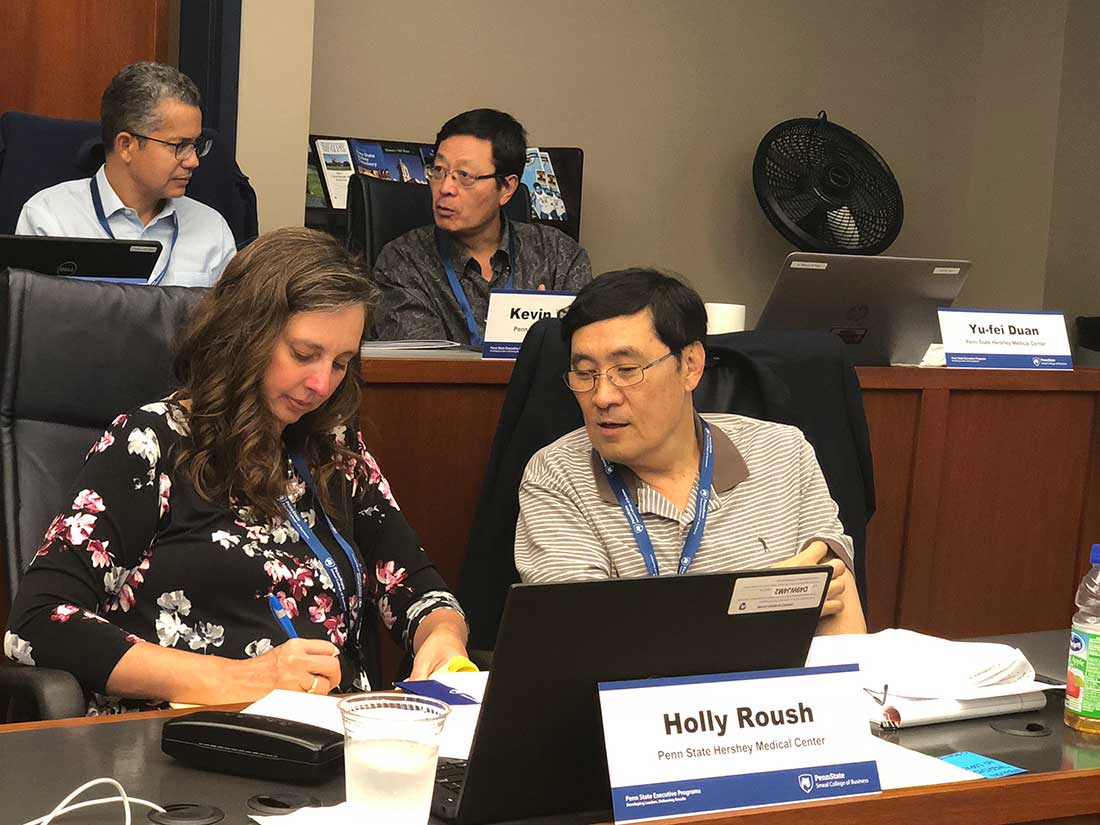Leadership Academy expands horizons of emerging leaders

By Carolyn Kimmel
From his clinical and academic vantage points, Dr. Todd Felix didn’t realize how much today’s competitive health care marketplace impacts the mission of Penn State Health.
After spending five eight-hour days at the Leadership Academy of Penn State Health Milton S. Hershey Medical Center and Penn State College of Medicine, the assistant dean for clinical medicine in the Department of Family and Community Medicine understood the challenges much more clearly and found himself better able to lead.
“I got a much broader view of Penn State Health’s strategic plan, which is very helpful,” Felix said.
As a leader of a group of physician educators in multiple departments, all with different priorities and experiences, he sees change as inevitable.
“This course helped me see the importance of style preference among my team—originators full of new ideas to conservers dedicated to keeping things running smoothly—to be successful in implementing change and staying relevant, current and visionary in the education mission,” he said.
Felix was one of 32 emerging leaders invited to attend the Leadership Academy, a joint effort of the College of Medicine’s Office of Faculty Development, Penn State Smeal College of Business and Penn State Executive Programs aimed at promoting strategic leadership and management skills among leaders.
“One of the strengths of the academy is that it involves people from all walks of life at the health system— faculty, clinicians, nurses, administrators, researchers, scientists,” said Dr. Barbara Ostrov, former associate dean for faculty and professional development at the College of Medicine. “Watching the attendees become engaged and enlivened, and seeing new collaborations among people who didn’t know each other before is exciting.”
The interactive program also expands knowledge about the organization and provides a tool set for leaders to be more effective and efficient, said Dr. Jeffrey Miller, Department of Dermatology chair at the Milton S. Hershey Medical Center, whose idea it was to create the Leadership Academy after earning his executive Master of Business Administration (MBA) from Smeal College.
“When I was working on my executive MBA, I was exposed to disciplines like finance, marketing and change management that I never learned about in medical school,” he said. “I wanted to bring that back to Penn State Health. Organizations that invest in the personal and professional development of their employees can be even more successful.”
With support from top administrators of the College of Medicine and Penn State Health, the first Leadership Academy seven years ago drew 25 attendees, and it’s grown every year since.

Leadership Academy members participate in an interactive “colorblind” game designed to promote effective communication and teamwork.
Nicole Smith, a veteran employee of Penn State Health for more than 14 years who took on a leadership position 18 months ago, said the program provided her with a new perspective on strategy development at the top level all the way down to the department level.
“I have a better understanding of why organizations succeed and fail,” said Smith, director of operations for Penn State Health Office of Marketing and Communications. “We spent time talking about the culture of the organization and how we need to come together to keep us functioning as a successful health care organization.”
The goal is to give attendees more insight and ability to lead strategically, specifically in order to stay successful in today’s competitive health care environment, according to Al Vicere, faculty director of the Leadership Academy, which takes place at University Park.
“Our program is tailored to what’s going on in the outside world—regulations, affordability, availability of care— that affects strategic decisions at the College of Medicine and Penn State Health, and how attendees can interpret that for employees in their departments,” Vicere said.
Academic medical centers are multi-mission—they’re not just health care providers, they are also educational and research institutions—and they are under great financial pressure to respond to the latest changes. It’s imperative to help leaders at high levels understand how and why the organization needs to respond.”
Toward that end, Penn State Health is putting much more effort into implementing a transparent strategic planning process and communicating it to employees for their engagement, he said.
Lisa Olenski, vice president of operational excellence at Hershey Medical Center, said the biggest asset she gained was a broader knowledge of how textbook strategy relates to Penn State Health’s strategy.
“Understanding strategy at the system level helps me translate it at the operational level to frontline associates who will deliver on it,” she said.
Both Olenski and Smith said they were inspired by the colleagues they met who shared similar passions for how they could be better leaders in their respective areas.
“I learned so much from them and the challenges they face on a daily basis. I think many of us walked away with ideas on how we could work together better and what we could do to help move the culture forward,” Smith said.
Miller said the challenge is how to keep the excitement alive once leaders return to the daily demands of their job. The team holds two informal follow-up sessions to see how attendees are using what they’ve learned, and a formal study is looking at the impact of the program, he said.

Dr. Taffy Anderson, center, a physician advisor in Clinical Documentation Improvement at Penn State Health, discusses a classroom assignment with Dr. Dorothy Rocourt, a pediatric surgeon, and Dr. Todd Felix, a family and community medicine physician.
If you're having trouble accessing this content, or would like it in another format, please email the Penn State College of Medicine web department.
